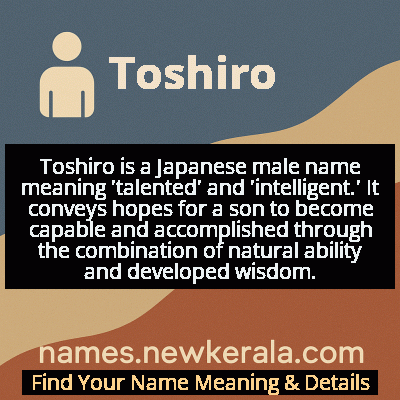Toshiro Name Meaning & Details
Origin, Popularity, Numerology Analysis & Name Meaning of Toshiro
Discover the origin, meaning, and cultural significance of the name TOSHIRO. Delve into its historical roots and explore the lasting impact it has had on communities and traditions.
Name
Toshiro
Gender
Male
Origin
Japanese
Lucky Number
5
Meaning of the Name - Toshiro
Toshiro is a Japanese male name meaning 'talented' and 'intelligent.' It conveys hopes for a son to become capable and accomplished through the combination of natural ability and developed wisdom.
Toshiro - Complete Numerology Analysis
Your Numerology Number
Based on Pythagorean Numerology System
Ruling Planet
Mercury
Positive Nature
Adventurous, dynamic, curious, and social.
Negative Traits
Restless, impatient, inconsistent, prone to indulgence.
Lucky Colours
Green, white.
Lucky Days
Wednesday.
Lucky Stones
Emerald.
Harmony Numbers
1, 3, 9.
Best Suited Professions
Sales, marketing, travel, entertainment.
What People Like About You
Versatility, charisma, adventurous spirit.
Famous People Named Toshiro
Toshiro Mifune
Actor
Legendary Japanese actor known for his intense performances in Akira Kurosawa's films and international cinema recognition
Toshiro Mayuzumi
Composer
Innovative composer who fused Japanese traditional music with Western avant-garde techniques
Toshiro Kandagawa
Fashion Designer
Influential fashion expert and television personality known for mentoring young designers
Toshiro Suga
Martial Artist
Aikido master who has promoted Japanese martial arts worldwide through teaching and demonstrations
Name Variations & International Equivalents
Click on blue names to explore their detailed meanings. Gray names with will be available soon.
Cultural & Historical Significance
In contemporary context, Toshiro serves as a cultural touchstone that maintains connection to traditional Japanese identity while adapting to modern sensibilities. The name evokes images of the ideal Japanese man: intelligent, capable, respectful of tradition, yet forward-looking. It represents the continuity of cultural heritage in an increasingly globalized world, where traditional names like Toshiro help preserve linguistic and cultural identity. The name's enduring popularity among certain segments of Japanese society demonstrates the ongoing relevance of these traditional values, even as naming trends evolve. Toshiro thus functions as both a personal identifier and a cultural symbol, carrying with it centuries of Japanese history and social expectation.
Extended Personality Analysis
Individuals named Toshiro are typically associated with a constellation of positive personality traits centered around intelligence, competence, and reliability. The name's meaning of 'talented' and 'intelligent' creates expectations of someone who is naturally gifted, quick-witted, and capable of excelling in various endeavors. These individuals are often perceived as having strong analytical abilities, good judgment, and the capacity for deep thinking. They tend to approach challenges with methodical precision and are known for their problem-solving skills. The traditional nature of the name also suggests a person who values discipline, honor, and responsibility, likely displaying maturity beyond their years and a serious approach to their commitments and relationships.
Beyond intellectual capabilities, Toshiro is associated with leadership qualities and emotional stability. People with this name are often seen as calm under pressure, possessing a composed demeanor that inspires confidence in others. They may exhibit a quiet authority rather than overt dominance, leading through competence rather than forcefulness. The name also implies a certain traditionalism or respect for established ways, suggesting someone who values knowledge, history, and cultural continuity. However, the 'talented' aspect of the name indicates creative potential and innovation, creating an interesting balance between tradition and progressiveness. This combination often results in individuals who are both grounded in principles and capable of original thinking, making them effective in roles that require both stability and adaptability.
Modern Usage & Popularity
In modern Japan, Toshiro maintains its status as a classic, respectable name though its popularity has fluctuated over recent decades. While not frequently appearing on contemporary top baby name lists, it continues to be chosen by parents who appreciate traditional Japanese names with meaningful kanji combinations and cultural depth. The name is particularly favored by families with strong connections to Japanese heritage or those seeking to honor family traditions. Its usage patterns show some regional variation, with higher incidence in areas known for preserving traditional customs. Internationally, the name has gained some recognition through Japanese cultural exports like anime and cinema, though it remains predominantly used within Japanese communities. The name's sophisticated image and association with accomplished figures like Toshiro Mifune contribute to its enduring appeal among parents seeking a name that conveys intelligence, capability, and cultural authenticity.
Symbolic & Spiritual Meanings
Symbolically, Toshiro represents the ideal of cultivated excellence and the Japanese concept of 'kodawari' - the pursuit of perfection in one's craft or calling. The name embodies the symbolic bridge between inherited tradition and individual achievement, suggesting that true talent emerges from the disciplined development of natural gifts. The combination of characters creates a powerful metaphor: the 'toshi' (talent) represents raw potential and innate ability, while the 'ro' (son) symbolizes the continuity of cultural legacy and the responsibility to carry forward ancestral wisdom. This symbolic duality makes Toshiro representative of the complete individual who honors their roots while striving for personal excellence. In a broader cultural context, the name symbolizes the Japanese values of continuous improvement (kaizen), respect for mastery, and the belief that individual talent should serve both personal fulfillment and communal benefit, reflecting the interconnectedness of personal achievement and social responsibility in Japanese philosophy.

